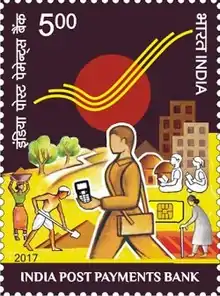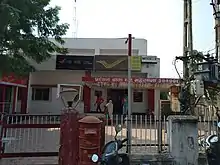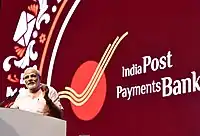India Post Payments Bank
India Post Payments Bank, abbreviated as IPPB, is a division of India Post which is under the ownership of the Department of Post, a department under Ministry of Communications of the Government of India. Opened in 2018, as of January 2022, the bank has more than 7 crore customers.
 | |
| Type | Division of Indian Post |
|---|---|
| Industry | Financial services |
| Founded | 1 September 2018 |
| Headquarters | , India |
Area served | India |
Key people | |
| Products | Banking |
| Services | Financial Services |
| Owner | India Post, Department of Post, Ministry of Communications, Government of India |
| Website | ippbonline |
History

On 19 August 2015, the India Post received licence to run a payments bank from the Reserve Bank of India. On 17 August 2016, it was registered as a public limited government company for setting up a payments bank.[1] IPPB is operating with the Department of Posts under Ministry of Communications.[1][2]
The pilot project of IPPB was inaugurated on 30 January 2017 at Raipur and Ranchi.[1] In August 2018, the Union Cabinet approved a cost of ₹1,435 crore (US$180 million) for setting up the bank.[3] The first phase of the bank with 650 branches and 3,250 post offices as access points was inaugurated on 1 September 2018.[4][5] Over ten thousand postmen have been roped into the first phase.[6][7] By September 2020, the bank had acquired about 3.5 crore customers.[8] The bank had acquired about 4 crore customers by December 2020. In January 2022, India Post Payments Bank has crossed 8 crore customers mark. [9]
Services

IPPB aims to utilize all of India's 155,015 post offices as access points and 3 lakh postal postmen and Grameen Dak Sewaks to provide doorstep banking services.[1][2]

.JPG.webp)
IPPB offers savings accounts, money transfer and insurances through the third parties, bill and utility payments.[1][10][11]
The bank also provides features like:
- Account: The bank offers savings and current accounts up to a balance of ₹2 Lakh.
- QR Card: Customers can use QR code payments eliminating the need to remember account numbers, PINs and passwords.
- Unified Payments Interface
- Immediate Payment Service
- National Electronic Funds Transfer
- Real-time gross settlement
- Bharat BillPay
- Direct Benefit Transfer
- RuPay Debit Card
- AEPS(Adhaar Enabled Payment Service)
IPPB has been allowed to link around 17 crore postal savings bank (PSB) accounts with its accounts.[12]
See also
References
- "About IPPB - IPPB". ippbonline.com. Retrieved 5 September 2018.
- "All you want to know about...India Post Payment Bank". @businessline. Retrieved 5 September 2018.
- Press Information Bureau. "Cabinet approves Revised Cost Estimate for setting up of India Post Payments Bank". pib.nic.in. Retrieved 5 September 2018.
- "India Post Payments Bank launched: Some important facts about IPPB". dna. Retrieved 5 September 2018.
- Agarwal, Nikhil (4 September 2018). "India Post Payments Bank replaces ATM/debit cards with QR cards. How to use them". Livemint. Retrieved 5 September 2018.
- Sharma, Devansh (20 August 2018). "Your friendly neighbourhood postman is about to become a banker". The Economic Times. Retrieved 5 September 2018.
- Sengupta, Devina; Singh, Karunjit (31 August 2018). "Government expects India post payments bank to be profitable after 2 years: Communications minister Manoj Sinha". The Economic Times. Retrieved 5 September 2018.
- "India Post Payments Bank adds 2.48 crore customers in a year". September 2020.
- "India Post Payments Bank customer base crosses 5-crore mark". The Economic Times. Retrieved 19 January 2022.
- Gupta, Komal (3 September 2018). "Explained: India Post Payments Bank, in 5 points". Livemint. Retrieved 5 September 2018.
- "India Post Payments Bank will deliver banking services to every Indian's doorstep, says PM Modi". www.businesstoday.in. Retrieved 27 September 2018.
- Livemint (31 August 2018). "India Post Payments Bank launched: 10 things to know". Mint. Retrieved 27 September 2018.